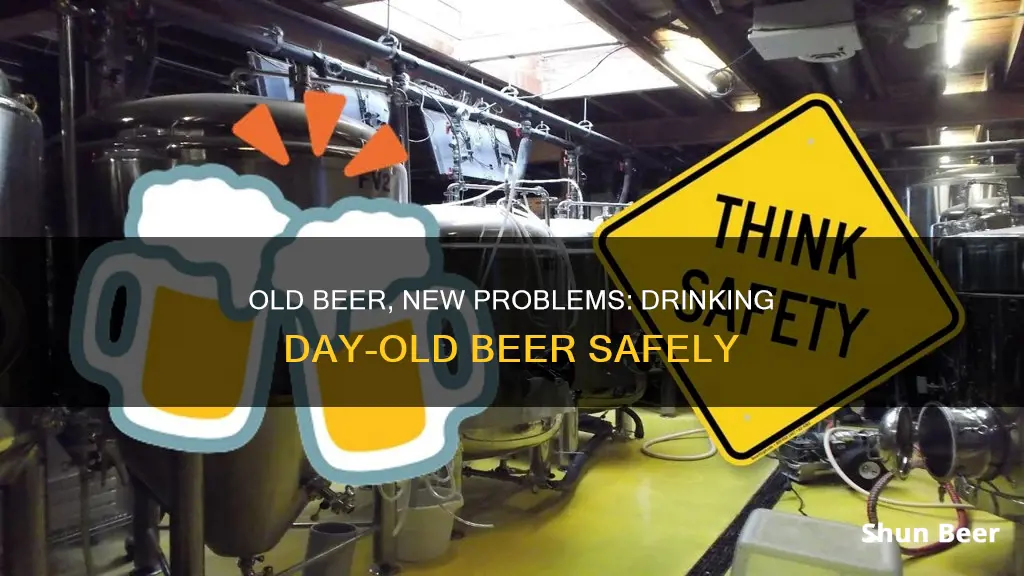
Drinking day-old open beer will not make you sick, but it might not taste very nice. Beer is unlikely to make you ill because the fermentation process used in brewing, as well as its low pH level and alcohol content, make it difficult for microorganisms to grow. However, the taste of beer changes over time as oxidation occurs, and it will go flat.
| Characteristics | Values |
|---|---|
| Can day old open beer make you sick? | No, but it will likely taste unpleasant. |
| Beer expiration | Beer does expire, but it is still safe to drink. |
| Beer shelf life | Beer is best consumed within its "drink-by" date for optimal taste. Opened beer has a shelf life of about a day. |
| Beer storage | Store beer in a cool, dark place, away from temperature fluctuations. Keep it upright to minimize oxidation. |
What You'll Learn

Beer expiration and shelf life
Beer does expire, but it doesn't become unsafe to consume. Instead, the flavour and quality deteriorate over time, and you may experience unpleasant tastes and aromas. Beer can be expected to last 5 to 9 months beyond the expiration date listed on the label at room temperature. Refrigeration can extend its life by up to 2 or 3 years. This applies to bottled beer, cans, and growlers, but only if they are unopened. Opened beer has a shelf life of about a day, regardless of its listed expiration date.
Beer companies usually print expiration dates on their packaging, which are typically 3 to 9 months from the bottling date. However, the listed date and the point at which the beer starts losing flavour are not the same. Beer stored at room temperature is best consumed within 6 to 9 months, while refrigeration can extend this period to up to 2 years. Unpasteurised or craft beers may have a shorter shelf life.
The type of beer also affects its shelf life. Stronger beers, such as stouts and porters, tend to last longer than lighter beers like lagers and pilsners. Beers with high alcohol content, such as barley wines and imperial stouts, can last for years and improve with age. Beers with lower alcohol content, such as pale ales and IPAs, are best consumed within 3 to 6 months to enjoy their hop character.
To maximise the shelf life of beer, it should be stored in a cool, dark place, away from temperature fluctuations. It should be kept upright to minimise oxidation, and direct sunlight should be avoided as UV rays can cause a skunky odour and taste. Brown bottles and aluminium cans offer better protection against UV light than clear or green bottles.
Wheat Beer: Unfiltered, Unsafe, or Undrinkable?
You may want to see also

Beer storage
Light Exposure
Avoid exposing beer to direct sunlight or fluorescent light. Sunlight contains UV rays that can cause a chemical reaction in the beer, breaking down its flavour components and resulting in a skunky odour and taste. This process is known as "skunking" or "lightstrike". Brown bottles are best at minimising light strike, while clear bottles offer no protection. Green bottles offer some protection but are less effective than brown ones.
Temperature Control
Beer should be stored in a cool, dry place, ideally between 45 and 55 degrees Fahrenheit (7-10 degrees Celsius for lighter beers, 10-12 degrees Celsius for standard ales, and 12-16 degrees Celsius for strong beers). Refrigeration is recommended, especially for unpasteurised beer, but if refrigerator space is limited, a cool, dark area such as a basement or garage is the next best option. Avoid freezing beer, as this can alter its texture and mouthfeel.
Oxygen Exposure
Minimise oxygen exposure by storing beer upright, as lying a beer on its side can increase the surface area exposed to oxygen and accelerate oxidation. Bottled beer is at higher risk of oxygen exposure than canned beer, and an airtight cap or stopper can help slow oxidation in opened bottles.
Other Considerations
- Sediment, a faded label, or leakage around the bottle opening may indicate that the beer has spoiled.
- Beer with a higher alcohol content typically has a longer shelf life.
- Beer should be consumed within a certain timeframe, depending on the type: light beers within 3-4 months, wheat beers and brown ales within 4 months, stouts and porters within 6 months, and barrel-aged beers can be aged for several years.
- Corked bottles should be stored upright to prevent mouldy or musty flavours from developing.
- Opened beer should be resealed and consumed as soon as possible, as it will quickly lose carbonation and freshness.
By following these guidelines, beer enthusiasts can ensure their beer remains in optimal condition and maximise their enjoyment of this beloved beverage.
Exploring the Safe Daily Beer Consumption Limit
You may want to see also

Beer quality and taste
Beer does expire, but it doesn't spoil in the same way that food does. Beer is unlikely to make you sick, even if it's been sitting out for a while, due to the fermentation process, low pH level, and alcohol content, which make it an unfriendly environment for microorganisms. However, the taste of the beer will change over time, and it may lose its carbonation and develop an unpleasant aroma and flavour.
The shelf life of beer varies depending on the type of beer and how it is stored. Most beers are best consumed within 6 to 9 months if stored at room temperature, and refrigeration can extend this period to up to 2 years. Unpasteurized or craft beers may have a shorter shelf life. Stronger beers, such as stouts and porters, tend to have a longer shelf life than lighter beers like lagers and pilsners.
To maintain the quality and taste of your beer, it's important to store it properly. Beer should be kept in a cool, dark place, away from temperature fluctuations. Keeping it in the refrigerator is ideal, but if that's not possible, a cool basement or cellar is the next best option. Beer should also be stored upright to minimize oxidation. Exposure to sunlight should be avoided, as UV rays can cause the beer to develop a skunky odour and taste.
The type of packaging can also affect the shelf life of beer. Beer in clear or green bottles is more susceptible to light exposure, which can cause oxidation and a deterioration of flavours. Brown bottles offer better protection, while cans completely shield the beer from light, helping to preserve its quality for longer.
Some beers, like certain wines and whiskeys, can actually improve with age. Richer, higher-alcohol beers such as porters and stouts can develop more complex flavours over time, especially when stored in cool, dark conditions. On the other hand, IPAs and other hoppy beers are best consumed fresh, as they gradually lose their flavour and aroma.
In summary, while drinking day-old open beer is unlikely to make you sick, it's important to note that the quality and taste of beer can deteriorate over time, especially if it's not stored properly. To ensure the best drinking experience, it's recommended to consume beer as fresh as possible and to follow proper storage guidelines.
Legal Drinking Age: Beer and the 18-Year-Old
You may want to see also

Beer safety
Beer Expiration and Safety:
Beer does have a shelf life and can expire, but this doesn't necessarily mean it will make you sick. The fermentation process, low pH level, and alcohol content in beer create an environment that discourages the growth of harmful microorganisms. As a result, even if a beer sits unopened for years, it is unlikely to cause illness. However, the taste and quality of the beer will gradually deteriorate over time.
Day-Old Open Beer:
An opened bottle or can of beer, whether refrigerated or not, is generally only good for a day before oxidation starts to affect its flavour. Drinking day-old open beer is unlikely to cause illness, but the beer's quality and taste will likely suffer. Additionally, if the beer has been left out at room temperature, it may lose carbonation and become flat, further impacting its flavour and overall drinking experience.
Identifying Spoiled Beer:
It's important to know the signs of spoiled beer to ensure you're not consuming beer past its prime. Here are some indicators:
- Unusual aroma: Beer that has gone bad will often have an off-putting or vinegary smell.
- Lack of carbonation: If your beer is missing the usual fizz and foaming when opened, it may have lost its carbonation.
- Excessive sediment: Checking the bottom of the bottle for excessive sediment can help identify potential spoilage.
- Change in taste: Spoiled beer may taste like "wet cardboard" or become overly sweet or skunky.
Beer Storage Tips:
To maintain the freshness and quality of your beer, follow these storage tips:
- Store beer upright in a cool, dark place, preferably a refrigerator.
- Avoid exposure to sunlight and UV rays, as this can cause skunkiness in the beer.
- Minimize temperature fluctuations, as drastic changes can negatively impact the flavour.
- Consume beer within a few months of purchase for optimal freshness.
In conclusion, while drinking day-old open beer is unlikely to make you sick, it's important to prioritize taste and quality. Beer is best enjoyed fresh, so try to consume it as close to its "born-on" date as possible. By following proper storage practices and paying attention to expiration dates, you can ensure a pleasant and safe drinking experience.
Clearwater Beach: Beer Drinking Rules and Regulations
You may want to see also

Beer types and their longevity
Drinking day-old open beer will likely not make you sick, but it will probably taste unpleasant due to oxidation.
The longevity of beer depends on several factors, including packaging type, storage conditions, and the type of beer itself.
Packaging Types
Canned beer typically has a longer shelf life than bottled beer due to its ability to protect the beer from light exposure and oxygen, which are factors that contribute to spoilage. Bottled beer is best stored in dark bottles that block ultraviolet rays, as light exposure can cause beer to develop a skunky odour and taste.
Storage Conditions
Beer should be stored in a cool, dark place, away from direct sunlight and heat sources, and kept in an upright position to minimize oxidation and carbonation loss. The optimal storage temperature for beer is between 50°F and 55°F (10°C to 13°C). Beer stored in a refrigerator can last up to two or three years beyond its expiration date.
Beer Styles
Not all beers have the same shelf life. Hoppy beers, lagers, and ales typically have a shorter shelf life, while darker or aged beers, such as stouts, porters, barley wines, and Belgian ales, tend to have a longer shelf life. Beers with higher alcohol content also tend to last longer than those with lower alcohol content.
Can Dogs Drink Beer? Understanding Alcohol Consumption in Pets
You may want to see also
Frequently asked questions
Drinking day-old open beer will not make you sick, but it will not taste as good. Opened beer has a shelf life of about a day.
You can tell if a beer has gone bad from its colour, smell, taste, foam density, and overall appearance. If the beer has lost its fizz, it's a sign that the seal was broken and the flavour will be affected.
Beer typically lasts 5 to 9 months beyond the expiration date listed on the label. In a refrigerator, beer can last up to 2 or 3 additional years.
Store beer in a cool, dark place, away from temperature fluctuations. Keep it upright to minimise oxidation and avoid exposing it to direct sunlight.







